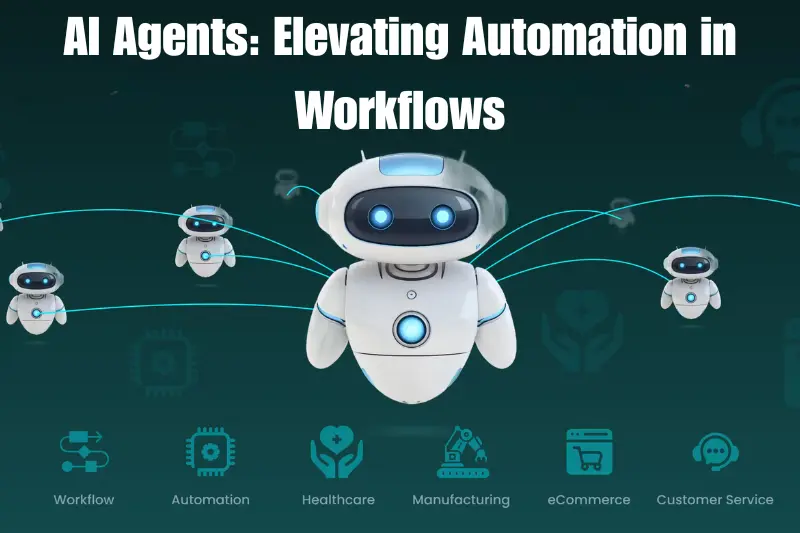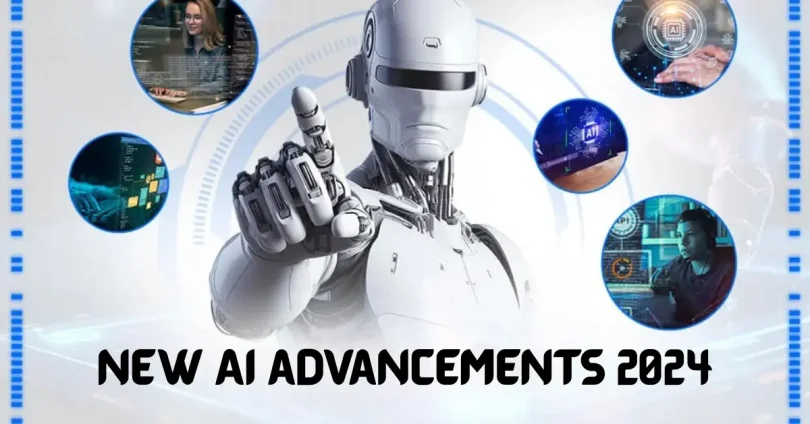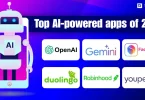Artificial Intelligence (AI) has continued to evolve at an exceptional rate in 2024. The new AI advancements 2024 are not only revolutionizing industries but also reshaping the way humans interact with technology. From innovations in healthcare and autonomous vehicles to breakthroughs in generative models, AI is playing a crucial role in addressing global challenges and enhancing personal and professional experiences.
Let’s dive into the major new AI advancements 2024 that are driving this transformation.
1. AI Agents: Elevating Automation in Workflows
 One of the standout new AI advancements 2024 is the development of AI agents that can autonomously perform a range of tasks previously handled by humans. These agents are designed to automate repetitive processes, reducing human error and increasing productivity across industries.
One of the standout new AI advancements 2024 is the development of AI agents that can autonomously perform a range of tasks previously handled by humans. These agents are designed to automate repetitive processes, reducing human error and increasing productivity across industries.
AI agents can be seen in action in several areas:
- Customer service: Chatbots and virtual assistants have become significantly more intelligent, capable of handling complex customer inquiries with a deep understanding of context and sentiment. These agents can now manage customer support tickets, resolve issues, and even predict customer needs, providing a seamless experience for users.
- Business operations: AI agents are now optimizing workflows by automating tasks such as scheduling, data entry, and project management. This frees up employees to focus on higher-value tasks, driving both efficiency and innovation.
- Healthcare: AI agents are aiding in administrative functions, such as processing patient data and scheduling appointments, allowing healthcare professionals to devote more time to patient care.
These AI agents learn from their interactions, adapting over time to improve performance. Their ability to self-optimize makes them a powerful tool in automating operations and enhancing efficiency.
You may also like to read this:
Latest Tech News USA: April 2025 Key Highlights
Top AI-Powered Apps Of 2024 To Enhance Your Daily Life
2025: How AI Is Revolutionizing Businesses In The USA?
Biggest Tech Company Updates Of 2025: AI & Innovation
Latest Updates On Apple, Google, And Microsoft In 2025
Breaking Technology News Today: Cybersecurity And AI News
2. Generative AI: Transforming Creative Industries
Generative AI has made significant strides in 2024, with the development of models like GPT-4, DALL·E 3, and Stable Diffusion. These tools are capable of creating high-quality content across various mediums—text, images, videos, and even music—almost indistinguishable from human-made works.
- Content creation: Generative AI is already being used extensively in industries like journalism, advertising, and filmmaking. For instance, AI systems can now write articles, create video scripts, and even generate video content autonomously. The speed and creativity AI brings to these industries are changing how media is produced, reducing costs, and accelerating time-to-market for content.
- Art and design: AI-powered tools like DALL·E 3 allow artists and designers to create stunning visuals, logos, and illustrations from simple text prompts. The ability to generate high-quality visual content quickly has democratized the design process, enabling smaller businesses and independent creators to compete with larger organizations.
However, with these new AI advancements 2024 come ethical concerns about intellectual property, misinformation, and the role of AI in creativity. It is critical for legal and ethical frameworks to evolve in tandem with AI’s growing capabilities to ensure that AI-generated content is used responsibly.
3. AI in Healthcare: Advancing Diagnostics and Treatments
AI has seen some of its most significant breakthroughs in healthcare in 2024. AI-powered systems now play an indispensable role in diagnosing diseases, developing personalized treatment plans, and even predicting patient outcomes.
- Improved diagnostics: AI algorithms are increasingly used to analyze medical data, such as radiology images, pathology slides, and genetic data. These systems are capable of identifying diseases with greater precision than traditional methods, enabling earlier detection and treatment. For example, AI is making strides in diagnosing conditions like cancer, where early intervention is critical to patient survival.
- Personalized medicine: AI is enabling the development of customized treatment plans based on an individual’s genetic makeup and health history. By analyzing vast amounts of data, AI can suggest the most effective drugs or therapies for each patient, leading to more successful treatments with fewer side effects.
- Robotic surgery: AI-powered robots are assisting surgeons in performing complex procedures with precision. These robots can analyze real-time data during surgery, adjusting instruments and tools to optimize outcomes. This reduces human error, shortens recovery times, and improves the overall success rate of surgeries.
4. AI-Powered Drug Discovery: Accelerating Medical Research
AI’s potential in drug discovery has been a game-changer in 2024. AI systems can now predict how molecular compounds will interact with the human body, vastly accelerating the process of identifying promising drug candidates.
- Faster drug discovery: Traditionally, drug discovery takes years, but with AI, pharmaceutical companies can now analyze vast datasets to predict which compounds may be effective against specific diseases. This process dramatically reduces the time required for preclinical and clinical trials.
- AI for rare diseases: AI is also being applied to rare diseases, which have historically received less attention in research. By analyzing genetic data, AI is uncovering potential treatments for conditions that were previously overlooked by researchers.
- Repurposing drugs: AI is being used to identify existing drugs that may be effective in treating diseases other than those they were originally designed for. This ability to repurpose drugs not only speeds up the treatment process but also reduces costs and risks associated with developing entirely new drugs.
5. Multimodal AI: Integrating Multiple Data Types
Multimodal AI represents one of the most groundbreaking new AI advancements 2024. These systems integrate data from various sources—text, audio, images, and video—into a single, cohesive understanding. This integration allows for more comprehensive analyses and richer outputs.
- Healthcare applications: For instance, AI systems now combine radiological imaging, patient medical history, and genetic information to provide holistic treatment plans. These multimodal systems can process multiple layers of data at once, providing doctors with more precise insights into a patient’s condition.
- Entertainment and media: In the entertainment industry, multimodal AI is being used to create immersive content experiences, where video, sound, and interactive elements are synchronized. AI systems can also summarize long-form video content and extract key insights, making content consumption more efficient.
By merging different types of data, multimodal AI enables richer, more accurate decision-making and opens up new possibilities in fields like education, entertainment, and customer service.
6. AI for Sustainability: Fighting Climate Change
 With environmental concerns becoming increasingly urgent, new AI advancements 2024 are being used to address sustainability challenges and mitigate the effects of climate change.
With environmental concerns becoming increasingly urgent, new AI advancements 2024 are being used to address sustainability challenges and mitigate the effects of climate change.
- Energy optimization: AI is now used to optimize energy consumption across industries, improving the efficiency of power grids and renewable energy sources like solar and wind. AI algorithms can predict energy demand in real-time, helping to balance supply and demand more effectively, reducing waste and lowering carbon emissions.
- Climate modeling: AI is also being used to enhance climate predictions, allowing scientists to better understand and anticipate climate patterns. These insights are helping policymakers make more informed decisions about environmental regulations and climate adaptation strategies.
- Sustainable agriculture: AI-driven technologies are transforming agriculture by optimizing irrigation systems, predicting crop yields, and minimizing pesticide use. This reduces the environmental impact of farming while improving food security.
7. Autonomous Systems: Progress in Self-Driving Vehicles
In 2024, self-driving cars have reached new levels of sophistication, thanks to new AI advancements 2024. Autonomous systems are now more reliable, safer, and capable of navigating complex environments.
- Improved navigation: AI is helping self-driving cars better navigate through dense city traffic, adjusting routes in real-time based on road conditions, traffic flow, and weather patterns. The introduction of these systems is expected to significantly reduce traffic accidents caused by human error.
- Autonomous trucks: AI is also transforming logistics by enabling autonomous trucks to transport goods more efficiently. These self-driving trucks can operate for longer hours than human drivers, optimizing delivery routes and reducing fuel consumption.
As these autonomous systems become more reliable, they hold the potential to revolutionize transportation and logistics, reducing costs and improving efficiency.
8. Natural Language Processing (NLP): Enhancing Human-AI Interaction
Natural Language Processing (NLP) has undergone remarkable advancements in 2024, enabling more intuitive and human-like interactions between AI and users.
- Context-aware communication: AI systems are now better at understanding the context, tone, and emotions behind human speech, enabling them to engage in more natural conversations. This is particularly evident in virtual assistants, customer service chatbots, and language translation services.
- Real-time translation: NLP advancements are also improving real-time translation, making it easier to break down language barriers in international business, travel, and diplomatic relations. AI systems can now provide more accurate translations that preserve meaning and nuance.
9. AI in Cybersecurity: Strengthening Protection
As cyberattacks become more sophisticated, AI is playing an essential role in defending against these threats. New AI advancements 2024 have made AI-powered cybersecurity systems more effective at identifying vulnerabilities and responding to attacks.
- Threat detection: AI algorithms can now detect unusual behavior and potential security breaches in real-time, significantly reducing response time. These systems are learning from historical data and can predict emerging threats based on patterns and anomalies.
- Preventing data breaches: AI is also being used to strengthen data protection by identifying and mitigating risks before they become critical. This is particularly important in industries like banking, healthcare, and government, where data security is paramount.
10. Ethical AI: Promoting Transparency and Fairness
With the rapid development of AI, new AI advancements 2024 are also placing an increased emphasis on ethical considerations. There is a growing focus on ensuring that AI systems are transparent, fair, and accountable.
- Reducing bias: One of the biggest challenges with AI is bias, which can emerge from biased data or algorithmic design. In 2024, researchers and companies are working to reduce bias in AI models by ensuring diverse training data and developing fairer algorithms.
- Explainable AI: There is also a push towards developing AI systems that are explainable and transparent, ensuring that users understand how AI decisions are made. This is particularly important in high-stakes fields like healthcare and law, where AI decisions can have life-altering consequences.
Conclusion
The new AI advancements 2024 are reshaping our world in profound ways. From healthcare and autonomous systems to sustainability and ethical AI, these innovations are enhancing our lives and solving some of the world’s most pressing challenges.
As AI continues to evolve, it is crucial that these advancements are applied responsibly, with an emphasis on fairness, transparency, and accountability. The future of AI is incredibly promising, and 2024 marks a pivotal year in its journey towards transforming society for the better.
FAQs
1. What are the key AI advancements in 2024?
Key advancements include AI agents automating tasks, generative AI for content creation, AI in healthcare for better diagnostics, autonomous systems like self-driving cars, multimodal AI combining text, image, and video data, and AI-driven sustainability efforts.
2. How is AI improving healthcare in 2024?
AI enhances healthcare by providing faster, more accurate diagnostics, personalizing treatment plans based on genetic data, and assisting in robotic surgeries to improve precision and recovery times.
3. What is generative AI and how is it used?
Generative AI creates content such as text, images, and videos. It’s transforming industries like media and design by enabling quick, scalable content creation, though it raises concerns about intellectual property and ethics.
4. How does AI contribute to sustainability?
AI optimizes energy use, improves renewable energy systems, and aids in sustainable farming. It’s helping reduce waste and promote efficient resource management, playing a key role in addressing climate change.
5. What is multimodal AI?
Multimodal AI combines text, images, audio, and video data to create more accurate and holistic analyses. It’s essential in fields like healthcare and entertainment, where diverse data is needed for deeper insights.







